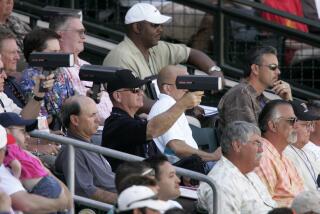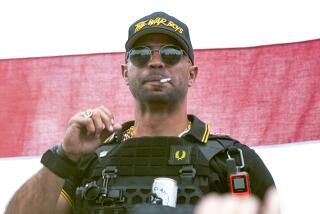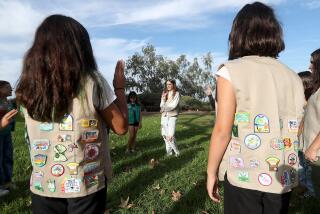Atheist Boys Win Battle to Be Scouts : Courts: O.C. judge rules that Cub pack’s expulsion of twins on religious grounds constitutes bias. Scout officials plan appeal.
SANTA ANA — In a major defeat for the Boys Scouts of America, an Orange County Superior Court judge ruled Thursday that twin Anaheim Hills brothers who do not believe in God must be allowed into Scouting.
The decision by Judge Richard O. Frazee Sr. allows William and Michael Randall to rejoin the Cub Scouts. They had been excluded from the program because they had refused to take an oath to God.
Scouting officials said they plan to appeal. “We feel very strong about our values and we have no intentions of letting this go on without an appeal,” said Blake Lewis, national spokesman for Boy Scouts of America. “Mainstream American families want these values for their young people.”
But to the 10-year-old Randall boys, the decision was a hard-fought victory that gives them a chance to rejoin a Cub Scout den.
“I feel so great I can’t even put it in words,” said William as he walked out of the courtroom.
“Me too,” beamed his identical twin brother, Michael. “I can’t wait to put my uniform back on . . . if it still fits.”
To the boy’s father, James Grafton Randall, an attorney who represented his sons during the 15-month-old case, Frazee’s decision was a “vindication.”
“There’s been a lot of personal attacks against us and our ability to be parents and raise our children,” he said as he fought back tears.
“This has been a very emotional case. My boys said, ‘Don’t have a cow, Dad,’ but Dad is having a cow right now.”
The judge’s ruling concludes--at least temporarily--a bitter court battle that saw outraged testimony from parents of other Cub Scouts, emotional pleas from the two Randall boys to be allowed to rejoin their pack, and derisive exchanges by attorneys.
For the Boy Scouts of America, the case was the first major legal challenge it has lost over its membership policy. Last March, a federal court judge in Chicago ruled that an 8-year-old atheist could be excluded from Scouting. And in another California case in May, 1991, a homosexual was precluded from becoming a Scoutmaster.
The Randall case started in January, 1991, when William and Michael’s den mother discovered that the boys did not swear an oath to God. They were told that they couldn’t advance in rank without fulfilling a religious requirement and were ultimately excluded from the organization.
Boy Scout officials said the time-honored Scout promise would not be altered for a pair of atheists. The “duty-to-God” principle is fundamental to the “Scouting movement,” its attorneys contended.
The Randalls then filed a lawsuit against the Orange County Council of the Boy Scouts of America to get back in their den.
James Randall argued that the boys were not asking that anything be changed, just that the Boy Scouts respect their religious rights, guaranteed under the U.S. Constitution and state anti-discrimination laws. To the Randalls, freedom of religion meant “freedom from religion.”
George Davidson, the attorney for the Boy Scouts, argued that it is the organization’s right of freedom of association that was threatened.
For both sides the case hinged on whether Scouting is defined as a private organization, with the discretion to pick and choose its members, or classified as a business establishment bound by the state Unruh Civil Rights Act, which says no business can discriminate on the basis of “sex, race, color (or) religion.”
During the six-week-long trial in Department 14 of Orange County Superior Court, a seemingly endless line of witnesses, including young Cub Scouts and avowed atheists, took the stand.
Davidson argued unsuccessfully that admitting nonbelievers would cause “a significant interference with the basic values that brought the group together.”
“Boy Scouts is not out to convert boys into believing in God,” he said in closing arguments last December. “It’s a vehicle for reinforcement of religious beliefs.”
The defense elicited the testimony of parents and various religious and Scouting leaders who said that a “duty to God” was essential for participation in the program.
Randall, however, pointed out that much of the organization’s own literature is ambiguous on the subject of God, does not define God and does not expressly state that atheists are automatically barred.
Randall also contended that testimony from several of the boys in Anaheim Hills Den 4, to which his sons once belonged, revealed that they didn’t know what “duty to God” meant. One boy testified during the trial that he thought it meant “to do all your chores.”
In his ruling Thursday, Frazee agreed with Randall that the 82-year-old organization was indeed a business establishment under state statute. He noted that the local chapter of the Boy Scouts of America employed 55 people, advertised for membership, owned considerable land, had an operating budget of more than $4 million and operated two Scout shops for the public, among other things.
He also ruled that religious activity “never is a purposeful part of any den meeting, and for that matter, any pack meeting. . . . On he contrary, the den meetings were directed towards fun and games.”
Further, Frazee said, whenever the subject of religion came up, the youths were told to talk to their parents about their beliefs.
The Boy Scouts’ right of freedom of association “will not be abridged by requiring (the Randall boys) to become and remain members of the Cub Scouts,” Frazee said.
At the end of his ruling, Frazee said the Randalls have the option to seek civil damages and attorney fees from the Boy Scouts if they wished. He set a June 17 court date to determine that matter.
Also at that hearing, Frazee’s ruling, which is tentative pending the filing of some legal papers, will become a permanent injunction against the Boy Scouts.
Randall said he was not interested in seeking civil damages, but might go after attorney fees.
“I don’t care about damages, I could care less,” he said. “If they wanted to drop this case now and not appeal it and shake hands, that would be fine. I wish they would.”
NO REGRETS, BUT . . .:Twins say they’re glad their long ordeal is finally over. A9
More to Read
Sign up for Essential California
The most important California stories and recommendations in your inbox every morning.
You may occasionally receive promotional content from the Los Angeles Times.









